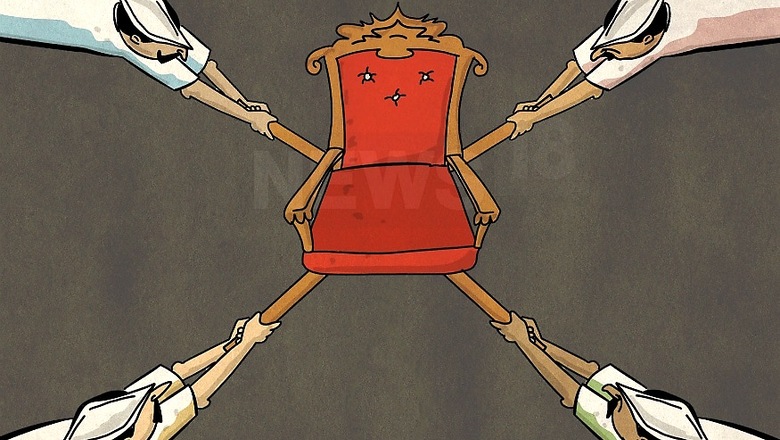
views
All of us bemoan the decline in morals and manners of our politicians, and rightly so. For no day passes when some incident about the depravity or crassness of our political masters does not get exposed; if they are not involved in some scam, they are making execrable statements. But it would be a mistake to single them out, as the fall is general. It would, therefore, be instructive to study the same in another area of mass interest — Hindi cinema.
There was a time when forests were green, women were beautiful, and men were chivalrous and heroic. But in this postmodern era, forests have been plundered, women drive SUVs, men go to beauty parlours, and chivalry is dead. And heroism has degenerated into punk culture.
In the 1950s and the 1960s, Dev Anand defined heroism on screen — urban, urbane, stylish, elegant, handsome, and gentlemanly. He also excelled in playing the role of a delinquent — as a pickpocket, a dacoit, a black-marketer, a smuggler, a crook, a gambler. Especially the last one. No other film star, in Hindi cinema or in Hollywood, has gambled on screen with such aplomb. The tilted head, a cigarette hanging delectably between his lips, the saucy dialogues which only Dev Anand could speak, the smile only he could smile.
Then there were Dilip Kumar and Raj Kapoor, the other two of the triumvirate that dominated the Hindi screen in those decades. They also played negative characters.
Yet, two aspects of noir characters of those days stand out. First, the moral fiber never snapped. And, second, the hero was never a punk, even when he was a criminal.
The hero did indulge in felony but was never comfortable in it. The circumstances (or haalaat, the oft-quoted term in Hindi cinema) goaded him to go astray, but not forever; he felt remorse; he was not happy in the domain beyond law and propriety. Remorse gnawed at his soul, forcing him to strive for redemption. This he invariably did, at his own expense.
In Pocketmaar, Dev Anand eschews his life as a pickpocket; he has to suffer a lot in the process. Similarly, in Gambler, he willingly gives up a life of ease, cunning, and transgression for an existence that is full of misery and despair (e.g., House No. 44 and Kala Bazaar). Dilip Kumar, having seduced a country girl (Nimmi) in Amar in a moment of weakness, willingly admits to his misdemeanor, thus sacrificing his love, Madhubala. In Shri 420, Raj Kapoor too gives up conning.
However, with the rise of moral relativism, which also somewhat condoned turpitude, the life and crimes of the contemporary hero-delinquent are portrayed as normal, even exemplar. Munna Bhai, MBBS is a prime example. There is an ill-mannered and shameless thug who cons his way into a medical college as a student. Not just that, he pontificates about ethics in the medical profession. Worse, many people have lauded the movie for this reason.
What has evidently escaped the notice of almost everybody is the absurdity of the situation: a goon is more humane, sagacious, and sensible than the best of doctors. Apparently, senior doctors and hospital managements should learn from him as to how to deal with low-ranking employees in a hospital and how to interact with patients! It is he who enlightens medical experts that critically injured patients should be immediately treated. He knows how to reform the medical system; the qualified doctors don’t know. Come to think of it, the guy who has broken bones all his life preaching doctors!
This is not to say that our hospitals are functioning perfectly. There are myriad problems — from the carelessness of doctors to the callousness of the paramedic staff, from corruption to bureaucratic apathy. But would a mobster reform the system?
The exaltation of crudeness and crassness by Sanjay Dutt (in the Munna Bhai series and elsewhere) is another unsavory development. He speaks the coarsest dialect — and it is widely approved of, as evident from various radio advertisements imitating him (vaat lag gai). He dresses and behaves like a punk and, what is worse, it is welcomed.
On the contrary, noir characters of yore never behaved in an unseemly manner. Dilip Kumar would be a decadent, self-destructing protagonist, but never a punk. Dev Anand was also always a gentleman. And when he was not, as in House No. 44, he aspired to become a “gentleman”.
The case of Akshay Kumar-Anupam Kher starrer Special 26 is even starker. Not only Akshay, protagonist of the 2013 Indian heist film, doesn’t suffer any conscience pricks and thus remains unrepentant and unreformed, the gang of robbers he leads also escapes any punishment for their crimes.
The officers of the Central Bureau of Investigation, who wanted to catch the criminals red-handed, are outsmarted; in fact, they end up unwittingly helping in the heist. The movie was not just a commercial success but also elicited rave reviews. Apparently, nobody noticed the moral vacuity, indeed its patent immorality, in the plot. Such are the perils of moral relativism.
Against such socio-cultural backdrop and moral permissiveness, don’t we expect too much from our politicians?
(The author is a freelance journalist. Views expressed in the article are personal.)














Comments
0 comment